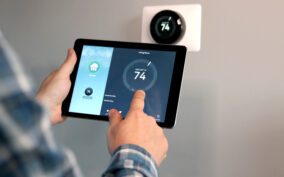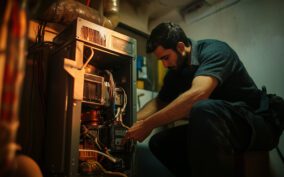Mar 29 2025
Why Does My Water Heater Keep Turning Off?
Few things are more frustrating than getting ready for a warm, relaxing shower—only to be met with icy cold water. You head to the water heater, turn it back on, and moments later, it shuts off again. Sound familiar? If so, you’re not alone, and you’ve come to the right place.
At Van Drunen Heating & Air Conditioning, we’ve been helping homeowners resolve frustrating hot water issues for over 50 years. Water heaters are intricate appliances, but we’ll walk you through the most common reasons they shut off and offer practical solutions to help you get your hot water running again.
Why Your Water Heater Keeps Shutting Off
Several factors could cause your water heater to keep turning off. Here are some of the most common problems people run into:
1. Age of the Water Heater
If your water heater is more than 10 years old, it may be on its last legs. Over time, wear and tear take their toll, and components begin to degrade. An aging water heater works less efficiently and is more prone to malfunctions that could stop it from operating altogether.
2. Sediment Build-Up in the Tank
Hard water contains calcium and magnesium that gradually settles at the bottom of your water heater tank. Over time, this sediment can build and reduce your heater’s efficiency, disrupt the heating process, or even cause the system to overheat and shut down.
3. Electrical or Gas Supply Issues
Both electric and gas water heaters require power to function:
- For electric water heaters: A tripped circuit breaker or faulty wiring could interrupt power to the unit.
- For gas water heaters: Issues like a faulty gas valve, burned-out pilot light, or even a gas leak can prevent your water heater from staying on.
4. Overheating or High-Temperature Cut-Off
Modern water heaters have a high-temperature cut-off switch as a safety feature. If your water heater overheats, it will automatically shut down to prevent damage or even dangerous accidents, such as an explosion. Overheating could result from a malfunctioning thermostat or excessive sediment build-up.
Steps to Troubleshoot the Issue
While some water heater problems require professional attention, there are steps you can take to troubleshoot the problem on your own:
1. Check the Power Source
- Electric units: Ensure the circuit breaker hasn’t tripped. If it has, reset it and see if this resolves the issue.
- Gas units: Check if the pilot light is lit. If not, follow the manufacturer’s instructions to safely relight it.
2. Flush the Tank
If you suspect sediment build-up, flushing the tank can help. Here’s a simple process:
- Turn off the power source to your water heater.
- Connect a hose to the tank’s drain valve and direct the other end outdoors or to a drain.
- Open the valve and flush the tank until the water runs clear.
- Close the valve, disconnect the hose, and refill the tank before powering it back on.
Flushing your water heater can improve efficiency and extend its lifespan.
3. Inspect the Thermostat Settings
Check that your thermostat is set to an appropriate temperature—120°F to 130°F is ideal. A thermostat set too high could be causing your water heater to overheat and shut off.
4. Call a Professional
If you’ve tried these steps and the issue persists, bring in an expert. There may be a more complex problem, such as a failed internal component, faulty wiring, or a gas valve issue. The licensed technicians at Van Drunen Heating & Air Conditioning can quickly diagnose and resolve your water heater problems.
Preventing Future Shutdowns
Preventive maintenance is key to keeping your water heater running smoothly and avoiding future frustrations. Here’s how to give your system the care it needs:
1. Regularly Flush and Clean the Tank
Perform a tank flush at least once a year to prevent sediment from accumulating. Hard water areas may require more frequent cleaning.
2. Inspect and Replace the Anode Rod
The anode rod is a crucial component that helps prevent tank corrosion. Inspect it every 2–3 years and replace it if it’s worn out—this can significantly extend the life of your water heater.
3. Monitor Water Pressure and Temperature
High water pressure or excessively high temperatures can place unnecessary stress on your system. Use a pressure gauge to ensure your home’s water pressure doesn’t exceed 80 psi, and keep the thermostat within the safe range of 120–130°F.
4. Schedule Professional Inspections
Annual inspections can help you find potential issues early and ensure all components, from the gas valves to the thermostat, are working correctly.
Regain Control of Your Hot Water Today
Water heaters are an essential part of your everyday comfort, and when they stop working, it can quickly become a source of stress. Understanding the issues behind frequent shutdowns and taking proactive steps to keep your water heater in good shape can save you in the long run.
Still dealing with persistent water heater problems? Don’t wait for the frustration to snowball into a bigger issue. At Van Drunen Heating & Air Conditioning, we’ve been helping homeowners across Northwest Indiana and South Cook County solve heating and cooling problems for over 50 years. Our licensed professionals are here to bring your hot water back—and keep it that way. Contact us today.




